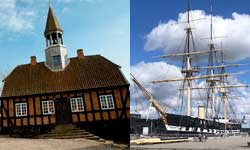The President then welcomed everybody to the meeting and especially the new Delegates, 2 from France, Mr. Christophe Ballarin and Mr. Pierre Naudet and the German representative Mr. Henning Vogt. The President advised that Iceland and Norway had decided to become full members from 2024.
In the Presidents report he addressed the major issues of insecurity in the marketplace, due to the wars in Ukraine and Gaza, and the climate also making the conditions for the forest nurseries extremely challenging. While EFNA are working to achieve more members – it must be remembered that the EFNA Constitution makes clear only countries with national Forest nursery Trade Associations can obtain membership. This is a difficulty for some countries as they don’t have these yet.
The development of EFNA activities relies on the involvement of the members and the prioritization of the issues, and the information flow between President, the Technical Secretary and the members. The EFNA website should be more important for the communication to the public, while having an internal ‘Members section’ for internal EFNA matters and debate.
The most important issue currently is the EU proposal on the Regulation of forest reproductive material (FRM). The positions of EFNA on crucial parts of the proposal was constructed by the Presidency from input from the members and the debate resulting from these. The proposal had been adjusted by the EU Counsel and the EU Parliament before it was elected by the EU Parliament in May 2024 – but an election of the EU Parliament on the 9th of June required the proposal to be handled by the new EU Parliament, and in the end it was finally agreed in the Trialogue in autumn 2024. EFNA have new feedback from members to be presented to the EU for this final part of the process.
The climate change, the need for more CO2 storage in forests, for more diversity and biodiversity in the future forests makes the need for further planting of forest plants, of the best quality for the changing conditions. EFNA is involved in the EU Horizon 2030 project OptFORESTS, to contribute to a survey on the current status of forest nurseries and tree seed suppliers, and to make recommendations to policy makers and the stakeholders involved in forestry, so that conditions for the production of timber and trade compliance can be achieved.
The German delegates advised of a potentially problematic issue in the EU legislation for forestry, which may also have implications for the forest nurseries. It is part of the European Deforestation Regulation (EUDR). When selling timber, you must collect and provide the GPS data from the forest source and supply traceability including proof of origin via a QR-code etc. on the invoices. This can be difficult for many foresters and could cause less harvesting in the forest and potentially less planting of material suited for the future climate. EFNA will make and circulate a statement which can be forwarded by the EFNA delegates to the stakeholders in their member countries.
The Belgian delegate Charlotte Allaert was elected as the future Vice President.


